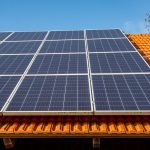 Greens on Sheffield City Council have proposed a big boost for renewable energy for the city.
Greens on Sheffield City Council have proposed a big boost for renewable energy for the city.
In a motion to Sheffield City Council, Green Councillors have submitted a number of proposals to increase the amount of energy produced in Sheffield from renewable technologies such as solar, wind and heat pumps.
Councillor Christine Gilligan, Deputy Chair of the Transport, Regeneration and Climate Policy Committee said,
“The energy crisis has brought home to many people the fact that we are very dependent on fossil fuels and at the mercy of undemocratic countries like Putin’s Russia and regimes like Saudi Arabia that have no respect for human rights. The ongoing climate crisis is reason enough to invest in renewable energy over expensive, slow to deliver and risky nuclear energy. Statements by the new Prime Minister Liz Truss about reintroducing fracking and expanding domestic fossil fuels is dangerous folly. It will have no impact on energy bills and UK greenhouse gases are just as dangerous as those from overseas. Renewable Energy with Energy Storage offers the best option to produce clean energy with stable prices.”
The Green motion calls on the Council to assess which of its land and buildings has the most potential to generate energy from solar and wind, to incorporate solar during construction of all Council new build projects and to adopt planning policies that encourage developers to incorporate renewable energy production in their developments.
Councillor Douglas Johnson said,
“The Renewable Energy Strategy, proposed by the Green Group will help people and businesses reduce their fuel bills and use renewable energy in their own homes and buildings. Another benefit is that it will help create secure skilled jobs for local people. We want all new council housing to incorporate solar panels but we also want the Council to establish an offer for private householders where they can install solar panels at no upfront cost by releasing some of the equity they have in their property, as has been done by other Councils .”
Motion to Sheffield City Council – (This motion will no longer be heard on 14/9/22 and will go forward to a future Council meeting after the Queens Funeral)
A Renewable Energy Strategy for Sheffield
Proposed by Cllr Christine Gilligan Kubo; seconded by Cllr Douglas Johnson
This Council believes
a. That, if Sheffield is to play its part in achieving the Paris Climate targets, meet its net zero target by 2030 and address the cost of living crisis, we need to reduce energy demand through energy efficiency measures such as retrofitting homes and other buildings; and to significantly raise the amount of energy we produce from renewable sources.
b. Having more of our energy produced from renewable sources helps us control costs by having secure forms of energy generated locally. Energy security means that the UK is less at the mercy of dubious and undemocratic regimes with poor human rights records that are often the suppliers of fossil fuels.
This Council resolves
c. to ask the Transport, Regeneration and Climate Change Policy Committee to:
i) Conduct an audit of the potential for renewable energy installations and energy efficiency measures on all Council land and property, draw up a priority list for installations based on the most potential to save energy and generate clean energy, and present it to the committee within 6 months.
ii) Install solar photovoltaics on all new build Council owned buildings where technically feasible, recognising that integrated roof systems are cheaper to install than retrofitting solar systems after construction.
iii) Create a Local Area Energy Plan for Sheffield that has the buy-in of the wider community and lead a local area energy planning process that involves both the network operators and other key stakeholders, including developers, energy experts and community energy groups
iv) Investigate establishing strategic partnerships with renewable and energy efficiency installers to help ensure certainty on cost and delivery of measures and report back to the Strategy and Resources Committee within 6 months.
v) Encourage the establishment of partnerships with local Community Renewables organisations to enable low cost/no cost installations funded through citizens’ investments.
vi) Maximise external funding to finance installations using Government, SYMCA and any ethical sources.
vii) Use funding available for solar installations from Cooperatives on Council Buildings and encourage take up of this funding by large commercial organisations.
viii) Encourage wider community investment in local renewable energy projects through a range of measures including but not limited to Community Share Offers and Municipal Bonds.
ix) Develop a compelling offer for private householders and Landlords to support the installation of solar photovoltaics and high cost energy efficiency measures.
x) Encourage best practice in Planning to support renewable energy installations by developers and to create a low carbon energy supply;
xi) Encourage renewable and energy efficiency skills by establishing links and relationships between our partners in the Renewable Energy and Energy Efficiency sectors with appropriate local training and education providers.
xii) Ensure training opportunities and new skills are included in all projects and contracts related to energy efficiency and renewables should include commitments from contractors on providing training opportunities and new skills for local people.
xiii) The Council should require new energy generation projects of 5MW or above to have at least 5% local ownership.

